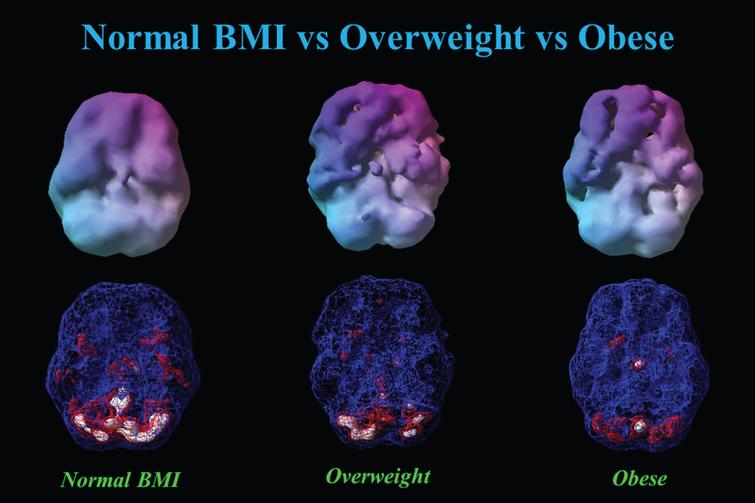Higher body mass index (BMI) linked to lower blood supply to the brain in large neuroimaging study

Figure 6 from the study, showing 3‑D renderings of cerebral perfusion averaged across normal BMI (23), overweight (29), and obese (37) 40-year-old men
Body weight has surprising, alarming impact on brain function (Science Daily):
As a person’s weight goes up, all regions of the brain go down in activity and blood flow, according to a new brain imaging study in the Journal of Alzheimer’s Disease … scientists analyzed over 35,000 functional neuroimaging scans using single-photon emission computerized tomography (SPECT) from more than 17,000 individuals to measure blood flow and brain activity.
Commenting on this study, George Perry, PhD, Editor-in-Chief of the Journal of Alzheimer’s Disease and Semmes Foundation Distinguished University Chair in Neurobiology at The University of Texas at San Antonio, stated, “Acceptance that Alzheimer’s disease is a lifestyle disease, little different from other age-related diseases, that is the sum of a lifetime is the most important breakthrough of the decade. Dr. Amen and collaborators provide compelling evidence that obesity alters blood supply to the brain to shrink the brain and promote Alzheimer’s disease. This is a major advance because it directly demonstrates how the brain responds to our body.”
The Study:
Patterns of Regional Cerebral Blood Flow as a Function of Obesity in Adults (Journal of Alzheimer’s Disease). From the abstract:
- Background: While obesity has been shown to be a risk factor for Alzheimer’s disease, the potential mechanisms underlying this risk may be clarified with better understanding of underlying physiology in obese persons.
- Objective: To identify patterns of cerebral perfusion abnormality in adults as a function of body mass index (BMI) defined weight categories, including overweight or obese status.
- Results: Across adulthood, higher BMI correlated with decreased perfusion on both resting and concentration brain SPECT scans. These are seen in virtually all brain regions, including those influenced by AD pathology such as the hippocampus.
- Conclusion: Greater BMI is associated with cerebral perfusion decreases in both resting and concentration SPECT scans across adulthood.
News in Context:
- Systematic review finds ten lifestyle factors that clearly impact the probability of developing Alzheimer’s disease (AD)
- Can you grow your hippocampus? Yes. Here’s how, and why it matters
- What are Cognitive Abilities and Skills, and How to Boost Them?
- Reminder: A brain-friendly lifestyle is the best approach to delay cognitive decline and dementia
- Cognitive training, diet, exercise, and vascular management seen to improve cognition even in people with genetic predisposition for dementia (APOE e4)


